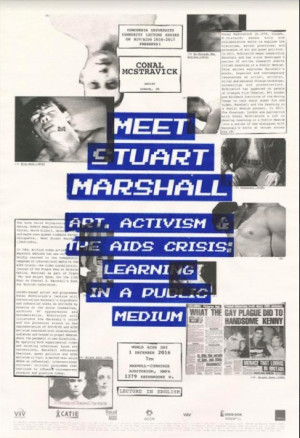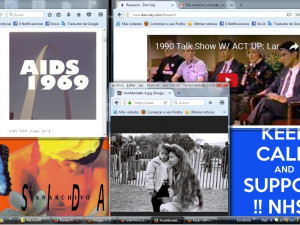Learning in a Public Medium
, –

In 2017 Conal McStravick, a London-based artist, worked with former Stuart Marshall collaborator Bruce Bayley and artist Adam Saad to develop a series of workshops for young people from Mosaic LGBT Youth Centre. These sought to explore what what is at stake in redrawing queer history, and to explore their own experiences as pathways to queer futures.
The workshops aimed to re-contextualise British video artist Stuart Marshall’s films like Bright Eyes, and the works that influenced it such as Gay Sweatshop Theatre’s As Time Goes By, as works that explore a century of queerness and what repression and liberation really mean to those who identify with the cultural and political making and re-making of LGBTQI community.
This public workshop will draw together and re-present highlighted material and workshop activities generated by parallel Learning in a Public Medium events in Belfast and Newcastle, and is an opportunity to re-visit the themes of these workshops, to share collaborative outcomes with others and reflect on some of the problems encountered.
This three part event will explore:
-
Repsonses to Stuart Marshall’s Idiophonics (1971) and the queer space of sound, AIDS activism and sound, and postcolonial perspectives on sound, visibility and public protest. (Developed with Circa, Newcastle, AMINI, Belfast, Adam Saad, Bruce Bayley and Mosaic LGBT Youth Group, London and Ferdiansyah Thajib, KUNCI Cultural Centre, Yogyakarta.)
-
The staging of care, self-care and choice in queer and feminist writing and video of the feminist movement, the women’s health movement and AIDS activism including works by Stuart Marshall, Jo Spence and Audrey Lorde. (Developed with Dr. Fiona Anderson and BA Fine Art students, Newcastle University Fine Art Department and workshop participants at The Northern Charter, Newcastle.)
-
A ‘Potluck Disco’ where to the background of moving images of gay and lesbian discos and music and sound drawn from the gay and lesbian archive we will share food, recipes, memories and movements as we discuss how the body archives queer experience. (Developed at Hospitalfield, Arbroath and in conversation with London-based artist Chloe Cooper.) Come with recipes and dance moves to share!
Conal McStravick (b.1979, Lurgan, N.Ireland) makes solo and collaborative works to explore the histories, social practices, and economies of art and queer politics. In 2013, McStravick began researching Marshall and has since developed a series of active research events titled Learning in a Public Medium. This series explores Marshall’s works, legacies and contemporary resonances as artist, activist, writer and educator through workshops, screenings and presentations. McStravick has appeared on panels at Glasgow Film Theatre, BFI London and Birkbeck Institute of the Moving Image to talk about queer film and video, Marshall and the Learning in a Public Medium project. In 2017, The Showroom, London are partnering with Conal McStravick & LUX to develop Learning in a Public Medium into a series of new dialogues with Marshall’s works at venues across the UK.
Stuart Marshall (b. 1949 Manchester, UK) was a founder member of London Video Arts in 1976, and was a committed advocate of British video art, as a practitioner, curator and theorist. He curated the first UK/Canadian Video Exchange in 1984 and his videos and writings were amongst the first to explore the relationship between video, television and the media. With later works such as Bright Eyes, he explored, and challenged, misrepresentations of homosexuality during the AIDS epidemic of the 1980s, at a time when lesbian and gay lifestyles and sexuality were under attack as a result of Clause 28 and the media-encouraged prejudice surrounding the spread of AIDS. Towards the end of his life, working with Maya Vision, Marshall made a number of Channel 4 commissioned documentaries concerning gay identity and he continued to be a passionate campaigner for gay rights.

